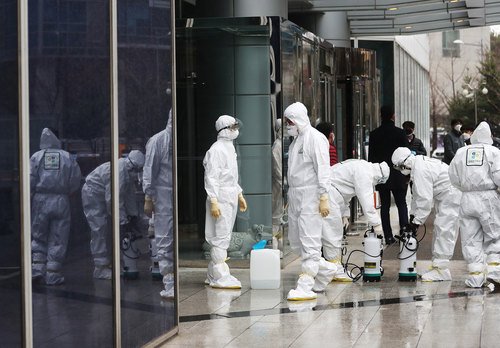Coronavirus has now spread to every continent except Antarctica

Public health officials warned Wednesday that the spread of the novel coronavirus is inching closer toward meeting the definition of a global pandemic, as the number of cases outside mainland China continues to grow, including in South Korea where a US soldier has tested positive for the virus.
Brazil announced its first case of coronavirus today, marking the first time the virus has been reported in South America. The outbreak has now spread to six of the world’s seven continents. It has not yet reached Antarctica.
Iran and Italy are also grappling with major outbreaks within their borders that have turned deadly, and a top official from the US Centers for Disease Control and Prevention (CDC) warned that the United States could see the virus spread within its borders.
“Ultimately we expect we will see community spread in this country. It’s not so much a question of if this will happen anymore, but rather more a question of exactly when this will happen and how many people in this country will have severe illness,” said Dr. Nancy Messonnier, the director of the CDC’s National Center for Immunization and Respiratory Diseases.
South Korea currently has the largest outbreak outside mainland China, with more than 1,200 people infected — including the first US soldier — and at least 12 dead. Iran’s health ministry has confirmed at least 139 cases and 19 fatalities. In Italy, at least 374 people have been infected and 12 have been killed, while Algeria, Croatia, mainland Spain and Switzerland all announced their first confirmed cases.
The World Health Organization (WHO) has so far held off on classifying the coronavirus’ spread as a global pandemic, but the outbreak appears to be getting closer to meeting the global health body’s definition of one.
The CDC’s Messonnier said Tuesday that the situation has met two of the criteria for a pandemic: “the fact that this virus has caused illness — including illness that has resulted in death — and sustained person-to-person spread.”
“As community spread is detected in more and more countries, the world moves closer towards meeting the third criteria: worldwide spread of the new virus,” she said.
To date, the virus has killed more than 2,760 people globally, 2,715 of whom are in mainland China. China’s National Health Commission reported that 406 confirmed cases were identified on Tuesday — all but five in hard-hit Hubei province — and 52 people were killed by the virus. The total number of people infected in mainland China is now 78,064, bringing the global total to 80,970.
The situation has rattled global markets and led to concern about the long term economic impact of the virus.
Investors and economists have been particularly concerned about how the continued shutdown of factories in China could affect global supply chains, but the new outbreaks in two major economies — Italy and South Korea — have rattled markets and dashed hopes of a speedy recovery, sparking this week’s worldwide stock rout.
South Korean outbreak spreads to the military
South Korean authorities are attempting to contain an outbreak that has gone from just 51 people infected last week to at least 1,260 as of Wednesday. The outbreak began in the southern city of Daegu and was centered around the Shincheonji religious group, but the virus appears to have spread now beyond practitioners.
Twenty members of the South Korean military have been confirmed infected, and the country’s defense ministry has placed significant restrictions on soldiers leaving their bases due to fears surrounding the virus. On Wednesday, it was announced that a US service member stationed in South Korea tested positive for the virus, according to US Forces Korea statement.
The soldier, who is stationed at Camp Carroll which is approximately 20 kilometers (12.4 miles) from the city of Daegu, is the first US service member to test positive for the novel coronavirus.
“The patient, a 23-year old male, is currently in self quarantine at his off-base residence. He visited Camp Walker on 24 February and Camp Carroll 21-25 February. KCDC and USFK health professionals are actively conducting contact tracing to determine whether any others may have been exposed,” the statement said.
The virus’ spread also prompted South Korea and the United States to scale back joint military drills, according to three US officials.
The three officials said this would be the first major impact of coronavirus on US military readiness, according to the officials. Without the full exercise, the US could lose ground in being able to quickly conduct future operations in a coordinated and highly synchronized manner with South Korea against North Korea in the event of a crisis, one of the officials said.
Iranian health official infected
Tehran continues to grapple with a significant outbreak that one lawmaker in the holy city of Qom, the epicenter of the Iranian outbreak, said has killed as many as 50 people, though the country’s health ministry has denied his claims.
Among the infected is Iran’s deputy health minister Iraj Harirchi. Harirchi appeared on television sweaty and ill to warn Iranians of coronavirus Monday, only to test positive for coronavirus on Tuesday.
In a news conference on national television, Harirchi coughed and wiped sweat from his face using tissues on several occasions. He was later diagnosed with coronavirus, according to state media.
Across the Middle East, flights from Iran have been halted and borders with the country have been closed as the region tries to keep the spread of a deadly coronavirus at bay. Several countries have also issued travel bans for the country.
The heavy economic sanctions imposed against Iran by the US and other bodies have made tackling the disease harder, with the country struggling to access novel coronavirus test kits, a board member of Iran’s Association of Medical Equipment Importers told the semi-official news agency ILNA on Sunday.
Italian officials try to calm fears
The worst outbreak outside Asia is in Italy, where authorities were on the defensive Tuesday as they faced tough questions over the country’s handling of the deadly virus as it spreads across the country’s northern regions.
Italian Prime Minister Giuseppe Conte tried to allay fears that the central government has no control over the affected regions after he was forced to admit that a hospital in the northern town of Codogno had mishandled the region’s first coronavirus case and had contributed to the deadly virus’ spread.
The cases are heavily concentrated in the region of Lombardy where 212 infections have been confirmed. Around 100,000 people in Lombardy and nearby Veneto are facing travel and other restrictions.
Conte on Monday night said that the hospital that treated the first coronavirus case in Codogno, known as Patient 1, had not followed protocol. Conte did not elaborate on what protocols were breached.
It was clear “there has been a management of the hospital not entirely proper according to prudent protocols, which are recommended in these cases, and this has certainly contributed to the spread,” he said.
Italian authorities have identified Patient 1 as a 38-year-old man, giving only the name Mattia.
Mattia was originally in intensive care for respiratory problems at a hospital in Codogno, but is now being treated at the Policlinico San Matteo in Pavia, about 35 kilometers (21.7 miles) south of Milan, Italian Civil Protection Agency spokesman Juri Pittaluga told CNN. Mattia’s pregnant wife, Valentina, has also tested positive for the virus and is in the Sacco hospital in Milan, but her health condition is “not worrying at all,” Pittaluga said.
Authorities in Italy have not yet identified Patient 0, the individual who suspected of bringing the coronavirus into the country.
Blame goes around in the United States
Government officials in the United States spent much of Tuesday assessing the situation, with several leveling accusations against their domestic and international counterparts.
US President Donald Trump has privately expressed frustration in recent days about some of the ways his administration is confronting a spreading coronavirus outbreak, according to people familiar with the conversations. Publicly, he has expressed optimism that the virus is “going to go away.”
Lawmakers in Congress, meanwhile, have voiced concerns that more needs to be done. Republicans and Democrats alike have suggested that the Trump administration’s response has exposed vulnerabilities.
“Looking ahead, we should be passing laws to make sure we have that manufacturing capability, that we have sufficient stockpiles. You know things expire. We need to be far more strategic about how we approach these things for the next potential pandemic,” Republican Sen. Ron Johnson said. “These are serious issues.”
Secretary of State Mike Pompeo was quick to criticize China and Iran, accusing both countries of a lack of transparency. He also alleged that attempts by both governments to stifle dissent has played a part in the virus’ spread.
“Had China permitted its own and foreign journalists and medical personnel to speak and investigate freely, Chinese officials and other nations would have been far better prepared to address the challenge,” Pompeo said.
The WHO has continually praised China’s response to the crisis, a move that has led critics to question the relationship between the two entities and whether the global health watchdog is sufficiently independent from Beijing, one of its most important financial patrons.


